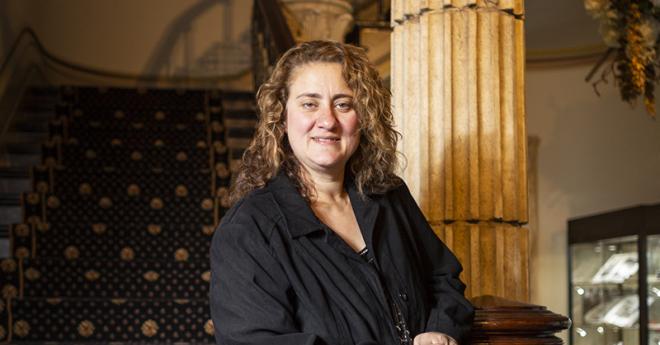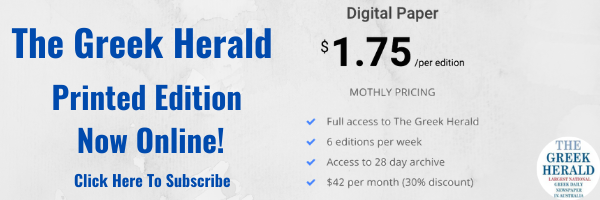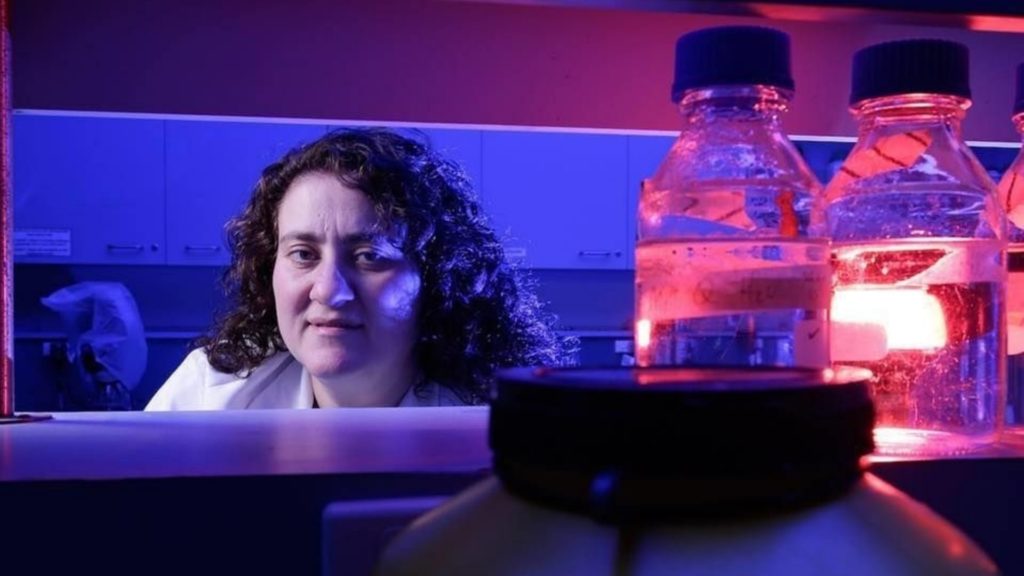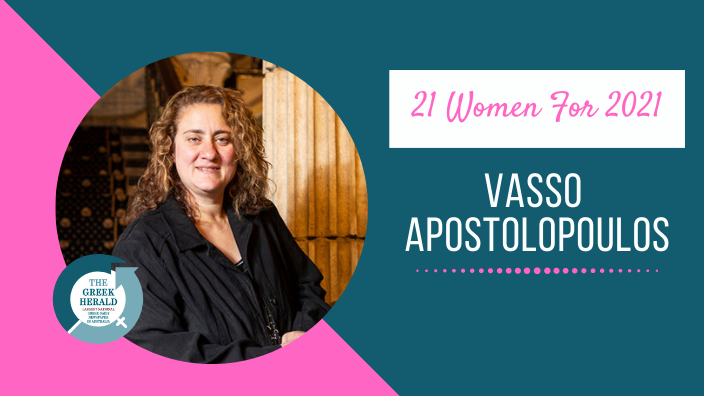By Ilias Karagiannis.
The coronavirus pandemic has triggered a global race to develop a vaccine. One prominent Greek Australian who has joined this race is Dr Vasso Apostolopoulos, who is a Professor of Immunology and Vice President of the Research Department at Victoria University.
Dr Apostolopoulos was the first researcher in the world to develop the theory of immunotherapy for breast cancer in the early 1990s, and she will now commence animals trials using a potential coronavirus vaccine in a lab at Victoria University.
She spoke exclusively to The Greek Herald.
1. Firstly, I would like to have a general comment on the way that the Australian Government have dealt with the pandemic? And do you think that the curve has been flattened?
The government has done a great job in introducing measures to deal with the pandemic. However, I find that the people are not listening. This weekend for example, the shopping centres are full of people and no-one is adhering to social distancing. The local shopping centre pre-COVID-19 at the best of times was only half full. During COVID-19 and stage 3 shutdown, the local shopping centre has a full carpark and you need to wait for a spot to become empty. I can’t understand where they all go, half the shops are closed anyway. Despite this, the number of cases have not sky rocketed, and have been well under control. Has the curve flattened? It appears to have flattened, however, how accurate is this? There are many infected people out in the community, with minor symptoms who have not been tested. It appears that only those with severe symptoms are being tested; those who tick some of the ‘common symptoms’ are told to self-isolate without being tested. Thus, even though the curve might not be very accurate, overall, Australia is doing quite well when we compare against the US, Spain, Italy, UK and other countries.
2. As a distinguished member of the Greek Australian community, I don’t know if you had the time to watch the news on the pandemic in Greece as well. Greece has gained positive publicity worldwide for the effective way they handled the crisis. Actually an immunologist who has born in Sydney, Sotiris Tsiodras, is the coordinator of the collective effort of the government. Do you have any comments to share with our readers about Greece?
I salute Greece for their outstanding effort in going into strict shutdown very early on. They are a great example worldwide of how they’ve managed the pandemic. The registration of when the people go out is a great idea, the fines to people who are not adhering to the rules, the requirement of masks when outdoors, and shutting down of schools, universities, cafes, restaurants, shops early on, all helped the number of cases to be well below most other European Countries. With a manageable 2,620 total cases in the last 3 months, Greece has done amazing. In addition, the great daily advice that Professor Sotirios Tsiordas has been giving to the community and bringing updates and awareness of the situation and the excellent advise for strict shutdown measures have also contributed to what has ‘saved’ Greece during this pandemic.

3. Researchers across the globe are racing to develop a vaccine for COVID-19. In your lab at Victoria University you are working on vaccines. Are you a step closer to human clinical test? And do you believe a vaccine will be found and if so, how quickly?
There are many labs around the world who are working on developing a vaccine against COVID-19. Each lab uses a different method of (i) isolated a region of the virus, whether it is a small peptide, a larger protein, the DNA or RNA of the virus and (ii) of delivering the vaccine in an appropriate manner to stimulate the correct immune response. There is a lot of talent, there is a lot of knowledge and a lot of expertise out there worldwide to develop vaccines. We at Victoria University are also developing a vaccine against COVID-19. We are using a platform technology with some modifications to develop a vaccine. We are undertaking all pre-clinical testing and if it all goes well, we will be ready to test it in humans. Usually, vaccines take about 10-15 years to make, however, with my 25 years experience in developing vaccines for other disorders this can be sped up to 12-18 months.
4 A lot of countries, among them Greece, are gradually easing the lockdown measures. Australia is doing something similar with schools in NSW. What needs to be done to reduce the transmission of COVID-19 in these new circumstances?
It is important not to rush this. Extreme precaution needs to be undertaken with small steps at a time. Schools should not re-open too quickly. In the 1918 pandemic of the Spanish flu, 2 million people died and once the infections/spread slowed down, they went back to normality which then, a second wave hit and killed 50 million people. We do not want to repeat history and we do not want to get a second more deadlier wave hit us now. It is therefore, crucial that people still adhere to social distancing, washing of hands, and even wearing of masks. In some countries, masks are compulsory. In Australia they are not, however they should be made compulsory, for everyone to have some sort of protection and prevent a second wave hitting us.
5. You have seen pandemics or epidemics and you know better from us the consequences. What does a return to normality look like after all this chaos? Will life after COVID-19 be completely different?
It will take a long time to return back to normality as we knew it before COVID-19. This could take 2-3 years at least. In the meantime, life in the next 1-2 years will still include social distancing to some degree, shaking hands and hugging when greeting will be minimal, and tables will be more spread out at cafes. Eventually we will get back to normality, we did after the 1918-1920 Spanish Flu. More, recently and to put it into perspective, the 2009 Swine flu infected 1.6 million people causing 500,000 deaths and, we did have a vaccine and drug available to control it. The Swine flu took 20 months to control. And we did go back to normality fairly quickly. COVID-19 however, is more infectious, symptoms are more severe, it is harder to control, and there are no vaccines or drugs to control it. Hence, my 2-3 years estimate to get back to normality.

6. Greece is heading to the summer season. Is there evidence that the hot, humid weather in the summer will suppress the COVID-19 like it does other coronaviruses?
There is some evidence to suggest that the hot humid weather in the summer will suppress COVID-19, however, this does not mean that everyone in Greece should go out and get back to normality immediately. If we think about it, in Australia we just went through summer and that did not stop cases, UAE has currently 35-40C and they have 13,600 cases, Singapore’s temperature is 30-35C and they have 17,550 cases, India has temperatures in 35-40C and they have almost 40,000 cases and Peru and Brazil who just had their summer season all have high cases, of 42,534 and 97,100 respectively. Hence, does the hot summer weather prevent COVID-19 spread? It does not seem like it. The spread is by cough droplets, and if there is an infected person, the heat won’t stop it from spreading. COVID-19 is highly infectious, precautions must be taken even if Greece is entering the summer season.
7. A lot of news seems contradictory regarding if someone who has been infected will be immune after his recovery. Any concrete data on this and are you afraid of a second wave?
If someone has been infected and has recovered, they should theoretically be immune from re-infection. However, there are some cases where some people who were infected are seen to be positive again weeks later. This could be that they had not completely recovered, despite being tested negative. In some cases the viral load is so low that the result comes back as negative, hence thinking that the person has recovered, but weeks later the viral load increases to detectable levels. It is also believed, in some people, reinfection could be from a mutated version of coronavirus and people show minor symptoms. We are still learning about this virus and there are still many unknowns. A second wave is most likely to occur if we rush to get back to normality, and new non-previously infected people would be infected.

8. We’ve heard epidemiologists in the past talk about the danger of a big pandemic. In your view, is this the Big One, and how does it compare with past pandemics?
Hippocrates, first noticed influenza in 412 BC and since the large pandemic in 1580 there have been influenza pandemics every 10-30 years. In the last 100 years alone we have had 4 Influenza pandemics, (i) 1918-1920 H1N1 Spanish flu pandemic infected 500 million people (1/3 of the world’s population at the time) and killed 50 million people; (ii) 1957-1958 H2N2 Asian flu pandemic with over 2 million deaths; (iii) 1968-1972 H3N2 Hong Kong Flu pandemic with over 1 million deaths; (iv) 2009-2010 H1N1 Swine flu which led to approximately 500,000 deaths. COVID-19 is the 3rd coronavirus pandemic, we had SARS in 2002-2004, MERS in 2012 and now COVID-19 in 2019. Throughout history we have had numerous other bacterial and viral pandemics, including, HIV/AIDS, Typhoid fever plague of Athens (420-426BC), Antonine Plague (165-180 AD) measles/smallpox with over 5 million deaths, Plague of Justinian (541-750 AD) which killed ¼-½ of the world’s population at the time, the black death (1331-1353) with estimated deaths of 75-200 million. Other pandemics/epidemics/world health emergencies, have included smallpox, measles, whooping cough, cholera, typhoid, tuberculosis, leprosy, malaria, yellow fever, zika virus.
As you can see, pandemics are not new, throughout history we have had many pandemics. COVID-19 is not the Big One, globally we have managed COVID-19 relatively well compared to other pandemics.
9. Would you like to send a message to our readers and the Greek Australian community, who are staying home and trying to cope in these extreme circumstances?
I urge the Greek Australian community not to rush to go out, even if the quarantine measures are reduced. We need to be careful, as we do not want a second wave coming through. Remember, the COVID-19 pandemic started with one infected person in China and look what’s happened worldwide. If one person is out there positive and we reduce quarantine measures, it may start all over again. Keep your social distancing, wash hands regularly and limit being in crowded places.
